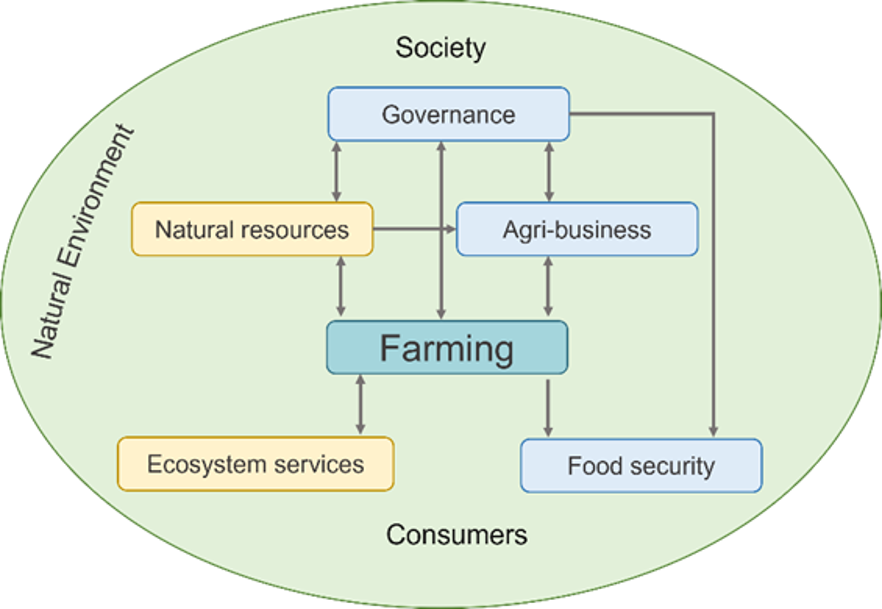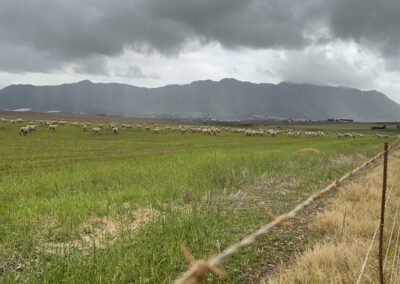[Photo credit: Grant Little – Senior Carbon Project Developer]
Thursday, 7 July 2023
What do these mean practically for farmers?
By Dr. Jackie Raw, Carbon Project Developer
Including the agricultural sector in climate change actions and policy has become increasingly more important over the past decade. Agriculture was first brought into international climate discussions at the 17th Conference of the Parties – COP of the United National Framework Convention on Climate Change (UNFCCC) which was held in Durban, South Africa in 2011. Since then, several concepts have been used to integrate agriculture into climate change actions for both mitigation and adaptation. These include climate-smart agriculture, nature-based solutions, and agroecology. But what are the main differences between these concepts (are they just buzzwords?), and how do they translate into farm-level practices?
Agricultural systems are uniquely (and perhaps precariously) positioned when it comes to climate change. Production demands are expected to continue to increase with an continuously growing global population, but it is estimated that over 50% of global agricultural land is in a degraded state1. In South Africa, the most significant climate change risk to agriculture is related to the increased severity and frequency of droughts. This will be especially detrimental for crops and livestock that are currently being produced in areas where conditions are already close to temperature and water availability thresholds2. Despite this, agricultural systems also provide opportunities for mitigating and adapting to climate change as described by three main concepts (see Box 1).
Box 1. Concepts relating agricultural systems to climate change mitigation and adaptation actions. Definitions as per the Food and Agricultural Organisation (FAO) of the United NationsAgroecology – a holistic and integrated approach that simultaneously applies ecological and social concepts and principles to the design and management of sustainable agriculture and food systems. It seeks to optimise the interactions between plants, animals, humans and the environment while also addressing the need for socially equitable food systems within which people can exercise choice over what they eat and how and where it is produced. Climate-Smart Agriculture (CSA) – an approach that helps guide actions to transform agri-food systems towards green and climate resilient practices. CSA supports reaching internationally agreed goals such as the SDGs and the Paris Agreement. It aims to tackle three main objectives: sustainably increasing agricultural productivity and incomes; adapting and building resilience to climate change; and reducing and/or removing greenhouse gas emissions, where possible. Nature-Based Solutions (NbS) for Agriculture – these encompass a broad range of practices that can be deployed directly in the context of the production of food and fibre, either by agricultural practitioners or on lands or waters used for production. Many of these practices align with an emerging field of practice called regenerative agriculture. |
While agroecology, climate-smart agriculture, and nature-based solutions share some similarities as approaches to guide agriculture under climate change, there are also some key differences.
Agroecology was developed as a concept with a scientific basis in both agronomy and ecology3 and it places emphasis on developing practices to achieve agricultural sustainability. Agroecology has also developed as a social movement to support small-scale farming systems that apply indigenous knowledge to protect soil resources, improve nutrient cycles, protect biodiversity, and promote social well-being in rural communities4. This is in contrast to agronomic models that propose high-input technology-based solutions and industrialised practices that are resource-intensive and considered environmentally destructive.
Climate-smart agriculture (CSA) as a concept aims to combine objectives for food security, sustainable development and greenhouse gas reductions. CSA endorses agro-industrial production methods if they can prove to be ecologically supportive i.e. soil conservation techniques5. The approach does not consider social or environmental impacts per se and this was a major source of criticism when the concept was initially promoted by the FAO. Since then there has been a general movement for CSA to include principles from agroecology6,7. While CSA tends to focus on policies, agroecology is strongly based on local farming practices that support agriculture as a socio-ecological system.
A socio-ecological framework for agriculture8 with arrows indicating the direction of influence of each component on the others. All components exist within the natural environment, therefore activities need to ensure ecological processes can support productive and sustainable agriculture.
Nature-based solutions (NbS) is the most recently developed concept and is used as an umbrella term for actions that involve restoring and enhancing nature to address societal challenges9. NbS for agriculture include practices and principles to manage farms for both ecological and human well-being10. Specific management and conservation actions that reduce GHG emissions and enhance the potential for carbon storage are considered natural climate solutions under NbS. Similar to agroecology, NbS for agriculture are focused on enhancing natural processes, including through application of indigenous knowledge10, to support agricultural productivity while ensuring sustainability1. NbS options include incorporating trees into croplands, ensuring optimal grazing intensity of livestock, and adapting fertiliser and irrigation practices to be less intensive. Besides avoiding carbon emissions and enhancing soil carbon, these approaches also deliver ‘co-benefits’ linked to ecosystem services from the agroecosystem (i.e. water availability, habitat and biodiversity support)1.
At the scale of individual farms and farming systems, certain agricultural practices may be aligned to multiple concepts. For example, crop diversification, planting drought-tolerant varieties, changing planting dates, and planting early maturing crops are dominant strategies applied by farmers in Africa in response to climate change11. Crop diversification is aligned with agroecology, while planting drought-tolerant varieties and changing planting dates are components of CSA. Similarly, communal and smallholder livestock farmers in South Africa have been participating in these recently defined climate-adaptive approaches for generations through targeting indigenous breeds that are inherently more resilient to climate change and have less environmental impact12.
Regardless of the alignment to different concepts, the challenge remains to transform the agricultural sector to be resilient under climate change and furthermore to provide opportunities for mitigation. At national scale, the strategic plan for the Agriculture, Forestry, and Other Land Use (AFOLU) sector includes advocating for the implementation of minimum- and no-tillage to expand conservation agriculture to ~ 6 million hectares13. The intent for this is to reduce soil disturbance and therefore enhance soil carbon stocks. Individual farmers also have a role to play and together can make significant contributions through applying a range of additional improved land management practices while still maintaining productivity14.
References
- Iseman, T. & Miralles-Wilhelm, F. Nature-based solutions in agriculture – The case and pathway for adoption. 53 https://doi.org/10.4060/cb3141en (2021).
- Engelbrecht, F. A. & Monteiro, P. M. S. The IPCC Assessment Report Six Working Group 1 report and southern Africa: Reasons to take action. South African Journal of Science 117, 1–7 (2021).
- Altieri, M. A. Agroecology: A new research and development paradigm for world agriculture. Agriculture, Ecosystems & Environment 27, 37–46 (1989).
- Valenzuela, H. Agroecology: A Global Paradigm to Challenge Mainstream Industrial Agriculture. Horticulturae 2, 2 (2016).
- Hrabanski, M. & Le Coq, J. F. Climatisation of agricultural issues in the international agenda through three competing epistemic communities: Climate-smart agriculture, agroecology, and nature-based solutions. Environmental Science & Policy 127, 311–320 (2022).
- Saj, S., Torquebiau, E., Hainzelin, E., Pages, J. & Maraux, F. The way forward: An agroecological perspective for Climate-Smart Agriculture. Agriculture, Ecosystems & Environment 250, 20–24 (2017).
- Akamani, K. An Ecosystem-Based Approach to Climate-Smart Agriculture with Some Considerations for Social Equity. Agronomy 11, 1564 (2021).
- Norton, L. R. Is it time for a socio-ecological revolution in agriculture? Agriculture, Ecosystems & Environment 235, 13–16 (2016).
- Seddon, N. et al. Understanding the value and limits of nature-based solutions to climate change and other global challenges. Philosophical Transactions of the Royal Society B: Biological Sciences 375, 20190120 (2020).
- Wynberg, R. et al. Nature-Based Solutions and Agroecology: Business as Usual or an Opportunity for Transformative Change? Environment: Science and Policy for Sustainable Development 65, 15–22 (2023).
- Magesa, B. A. et al. Understanding the farmers’ choices and adoption of adaptation strategies, and plans to climate change impact in Africa: A systematic review. Climate Services 30, 100362 (2023).
- Molieleng, L., Fourie, P. & Nwafor, I. Adoption of Climate Smart Agriculture by Communal Livestock Farmers in South Africa. Sustainability 13, 10468 (2021).
- DFFE. Department of Environment, Forestry, Fisheries 2019/20 – 2023/24 Strategic Plan and 2020/21 Annual Performance Plan. https://www.environment.gov.za/sites/default/files/docs/strategicplan202021to202324.pdf (2020).
- Okolie, C. C., Danso-Abbeam, G., Groupson-Paul, O. & Ogundeji, A. A. Climate-Smart Agriculture Amidst Climate Change to Enhance Agricultural Production: A Bibliometric Analysis. Land 12, 50 (2023).




